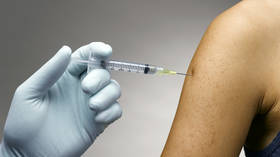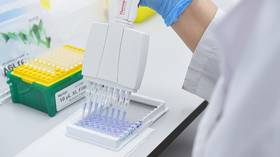As global anti-vax movements gain ground, growing number of Russians worry about taking any form of coronavirus vaccine

Russian scientists made global headlines in August when they unveiled Sputnik V, the first Covid-19 vaccine to be approved anywhere in the world. But as its roll-out nears, health officials face growing vaccine skepticism.
New polling from Moscow's Levada Center this week shows that as many as six in 10 Russians (59%) would be reluctant to be inoculated against the virus once the formula becomes widely available. This is a rise from just over half of respondents (54%) when the same question was asked two months ago.
While some professionals, including clinicians working closely with Covid-19 patients, have already been offered the vaccine, production is presently being expanded to support a mass immunization program. Russian President Vladimir Putin has said his government aims to begin the roll-out to people across the country before the end of 2020.
Anti-vaccine sentiment has been growing across the developed world, with only half of Americans saying they plan to receive the inoculation, while a poll of the British public found that only around four in ten said they definitely would. Earlier this year, a study in the influential scientific journal Nature warned that while the anti-vaccine movement is small, its influence and social media reach is significant, and could potentially “undermine efforts to end the coronavirus pandemic.”
Concerns have been raised by scientists and commentators, given how rapidly Sputnik V was approved by policymakers in Russia. University of Nottingham virologist Jonathan Ball said, “Whether it will work has not been established, and therefore it doesn’t strike me as being very sensible to roll this out routinely.” However, early clinical trials demonstrated impressive results, with a study in the Lancet reporting a strong immune response in all participants. Larger-scale studies are still ongoing.
Also on rt.com No Sputnik V for you! EU insists only ‘approved’ Covid vaccines allowed after Orban says Hungary is in talks with Russia & ChinaIncreasingly, commentators overseas are recognizing the benefits of making vaccines available as quickly as it is considered practical and safe. On Monday, former UK Prime Minister Tony Blair wrote that it made little sense to delay vaccinations if there are no safety concerns, arguing that “even efficacy at 50 percent is worth having, because it will save lives.”
Countries across the world appear to be taking the same approach, with Argentina confirming an order of 10 million doses of the Sputnik V vaccine on Monday, and Hungary in talks with Moscow to follow suit.
Like this story? Share it with a friend!














